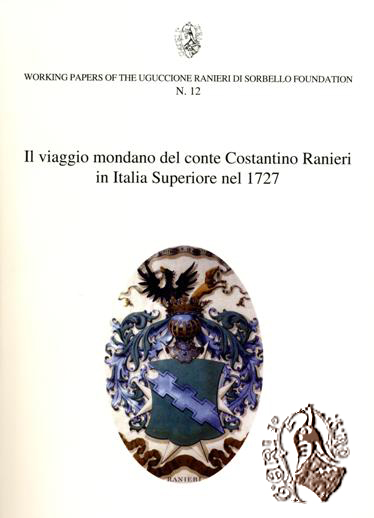
Notizie e Informazioni
Iscriviti alla Newsletter

UGUCCIONE RANIERI DI SORBELLO LECTURE 2009
Martedì 17 Novembre ore 17.30
(Palazzo Sorbello - Piazza Piccinino, 9 - Perugia)
Per l'appuntamento annuale della Uguccione Ranieri di Sorbello Lecture
Conferenza del prof. Steven Clemons (New America Foundation):
Gaging the course of US foreign policy: Has the Obama bubble burst?(Valutando gli sviluppi della politica statunitense: è finito il momento magico di Obama?)
Steven Clemons è Senior Fellow e Direttore dell’American Strategy Program presso la New America Foundation (Washington, D.C.), un istituto di studi politici indipendente, imparziale e senza fini di lucro che investe in nuovi intellettuali e nuove idee per aiutare gli Stati Uniti a far fronte alle grandi sfide del futuro. E’ anche direttore del Japan Policy Research Institute. Stimato commentatore, è, inoltre, collaboratore abituale di affermate testate giornalistiche come The Guardian, The New York Times e The Japan Times.
TESTO INTEGRALE DELL'INTERVENTO DEL PROF. CLEMONS:
Grading Obama: He Hasn’t Pulled Off Any Miracles Yet
At the October 2009 New York gala dinner of the International Crisis Group, former President Bill Clinton paid a moving tribute to the presidency of the man he had beaten, George H.W. Bush.
Clinton said that two key decisions that Bush 41 made vastly eased the challenges of Clinton’s presidency. Clinton cited first Bush’s decision to strongly embrace and support Russia under Boris Yeltsin’s leadership and secondly Bush’s encouragement that Helmut Kohl’s reunified Germany become Russia’s best friend in Europe. Clinton remarked that these were difficult, brave decisions that made the post-Cold War world a much safer place – but which at the time were complicated and risky.
Barack Obama, in contrast, received national security and economic portfolios from President George W. Bush riddled with crises of historic magnitude. When Bush entered office in January 2001, America was perceived to be in ascendance, riding the wave of American-led globalization and driving profound revolutions in information technology, genetic engineering, computing and more.
But when Bush left office eight years later, the mystique of America’s superpower status had been punctured. The Bush administration had exposed key military limits during the campaigns in Afghanistan and Iraq. In response, allies stopped depending on the US as much as they once did and foes began to move their agendas. Economically, America – the bastion of high-octane capitalism – managed to export toxic financial products to the rest of the world thus eroding trust in American economic leadership. Documented abuse and torture at Bagram, Abu Ghraib, and Guantanamo undermined for many in the world confidence in America’s moral leadership.
Barack Obama’s presidency started in a deep hole, much deeper than any US presidency in modern times. Against that backdrop, Obama’s performance deserves much applause for doing what needed to be done to avert global depression and for not tripping into any “new” back-breaking military deployments beyond what was then currently underway.
But avoiding worse problems than those in hand does not equal getting America back on a track where its power and global leverage are restored and in which the US is again the lead force in shaping the international system. On this front, Barack Obama and his team have generated mixed, and often disappointing, results.
On the domestic and international front, Obama has needed to reinvent American leverage and leadership in problem solving. He needed to convince Americans that he could help generate a new social contract between citizens, their employers, and the government and pushed major health care reform and a massive economic stimulus package to check off this box. Obama seems on the way to achieving some kind of significant expansion in health care coverage – but time will tell whether Americans feel that they have simply been burdened with more taxes and obligations during stressful economic times – or whether Obama will have indeed achieved a consequential domestic policy achievement that Americans will eventually embrace.
On the international front, Obama made a major commitment to other global stakeholders to lead on climate change remediation efforts as the lynchpin of a new global social contract between the US and the rest of the world. In addition, Obama promised to be a leader who ‘listened’ to other leaders, who would embrace multilateralism, operate via mutual respect, and would directly engage leaders of problematic nations like Iran, Venezuela, North Korea and Cuba in an effort to move them in a more constructive direction and stabilize the increasingly fragile dynamics of the global order.
Essentially, Obama acknowledged at the beginning of his administration that a combination of foreign and domestic policy incrementalism and inertia were going to take America over a cliff and into an abyss – particularly in the foreign policy and national security realms in which a superpower’s real weight is not embedded in the size of a military arsenal but rather in the perception other countries have of that nation’s abilities to achieve the global goals it sets for itself.
Obama realized when taking office that the world held significant doubts about the ability of the United States to alter the trend lines of any of the great global challenges – from dealing with the nuclear ambitions of North Korea and Iran, to reversing climate change, to reinvigorating a nuclear non-proliferation regime, to dealing with the growing arc of instability and Islamic radicalism running from North Africa through the Middle East to South Asia, to dealing with China’s rise and Russia’s increasingly provocative behavior, to dealing with human rights challenges in Africa and Southeast Asia.
Things were bad in so many places at the same time that the Obama presidency needed to establish priorities and achieve a laser like focus on solving key problems that if remedied could lead to significantly enhanced levels of confidence in America’s global leadership. In other words, Obama needed to surprise the international system with globally-altering achievements akin to Nixon’s opening to China and do this despite the world’s deep doubts about American leadership and power.
Obama’s foreign policy choices to pull off a Nixon to China achievement were only possible with one nation of global significance – Iran. But to move Iran off its strategic course that would probably lead to nuclear weapons acquisition, Obama had to move many other pieces of the global system into place in order to support the effort to engage Iran and shift its course. Some of these needed global shifts have gone relatively well, and others have been disastrous.
First, the Obama team needed to rob the Iranian government of bragging rights as self-proclaimed defender of the Islamic faith. Ridiculing Saudi and Gulf State gestures toward Israel in King Abdullah’s Arab Peace Initiative, Iran’s leaders threatened Israel with metaphors implying total destruction. Obama and many Middle East stakeholders believe that the establishment of a viable Palestinian state next to Israel would do much to remove the Palestine grievance from a narrative of humiliation by the West that many Muslims believe. Obama worked towards this goal by appointing former Senator George Mitchell to serve as an envoy to get Middle East peace negotiations moving again and ultimately leading to the creation of a viable Palestinian state.
Because of their permanent status in the United Nations Security Council, Russia and China also ranked high on Obama’s Iran action plan list. Obama has worked to redirect US relations with Russia and China away from contentious problems like the Russia-Georgia military clash and Eastern European deployments of US-controlled ballistic missile defense systems in the case of the former and away from human rights related issues in the case of China in order to secure the possibility of greater support for US and European efforts to seduce or force Iran to drop its nuclear ambitions.
On his Iran track, Obama also needed to demonstrate that America’s stock of perceived power was on the rise and not waning as under George W. Bush. Obama, in his now famous Nowruz message, spoke to the Iranian people in a courteous and affirming manner and did the same to Arab Muslims in his Cairo speech. These performances were vital in helping people to believe that a change in course was possible. For shifting the optics of what is possible in the global order – which is no small feat – Obama was awarded the Nobel Peace Prize.
As critics have suggested though, optics are not enough. World decision-makers may be impressed on many levels by Barack Obama’s humanity-affirming spin and rejection of pugnacious American unilateralism, but in the end – America needed to prove that it could substantively neutralize or change the character of some key global problems.
Obama has moved Russia and China relations onto less contentious paths. With Russia, Obama has launched a renewed effort to reify and reinvigorate a nuclear non-proliferation and warhead and nuclear supplies reduction efforts. With China, the US has engaged in close coordination on global economic matters and collaborated in climate change policy planning. These might seem positive developments, but neither China nor Russia have signed on fully to America’s Iran sanctions strategy – and have weakened America’s position as they resist.
In the Israel-Palestine conflict is a serious global fault line, Obama’s initial moves to get five Arab states to ante up with gestures favoring Israel in exchange for a settlements freeze completely fell apart. Israel Prime Minister Benjamin Netanyahu pushed Obama’s demands back – thus becoming for the Obama administration what Nikita Khrushchev was at the beginning of the John F. Kennedy administration: a leader who defined the limits and weakness of the new U.S. President. Khrushchev was, of course, an enemy of US interests – and Netanyahu is an ally – but the Israeli Prime Minister’s actions and Obama’s acquiescence to him on settlements have had a devastating negative impact on the way nations around the world view American power and Obama.
And add to the mix Obama’s ownership of the “good war” in Afghanistan, and the military’s call for greater troop deployments to forestall military disaster.
From Iran’s perspective, the US appears tied down in Afghanistan, pricked by withdrawal challenges in Iraq, beleaguered economically, unable to win a contest of wills with the Prime Minister of a small client state of the United States, and unable to push Russia and China to a harsher sanctions strategy. Despite Iran’s own internal drama after its election and Iran’s reduced stature in the Middle East after the crackdown on election protesters, Iran sees weakness in America – not resolve. They see a globally popular, charismatic American president working hard on a great number of issues – but ultimately unable to marshal the coalition of pressures and structural shifts that will allow him to even offer a credible Nixon Goes to China opportunity to Iran.
And thus in what Obama has most needed to achieve early in his tenure, a new course with Iran, he has failed. There are many years left for Obama to keep working on this desired strategic leap for US foreign policy, but in the mean time – America keeps demonstrating much to ill effect that it is not able to achieve the global goals it sets for itself – and thus is in the eyes of the world, on a track of slow decline.
-- Steve Clemons directs the American Strategy Program at the New America Foundation and publishes the popular political blog, The Washington Note




